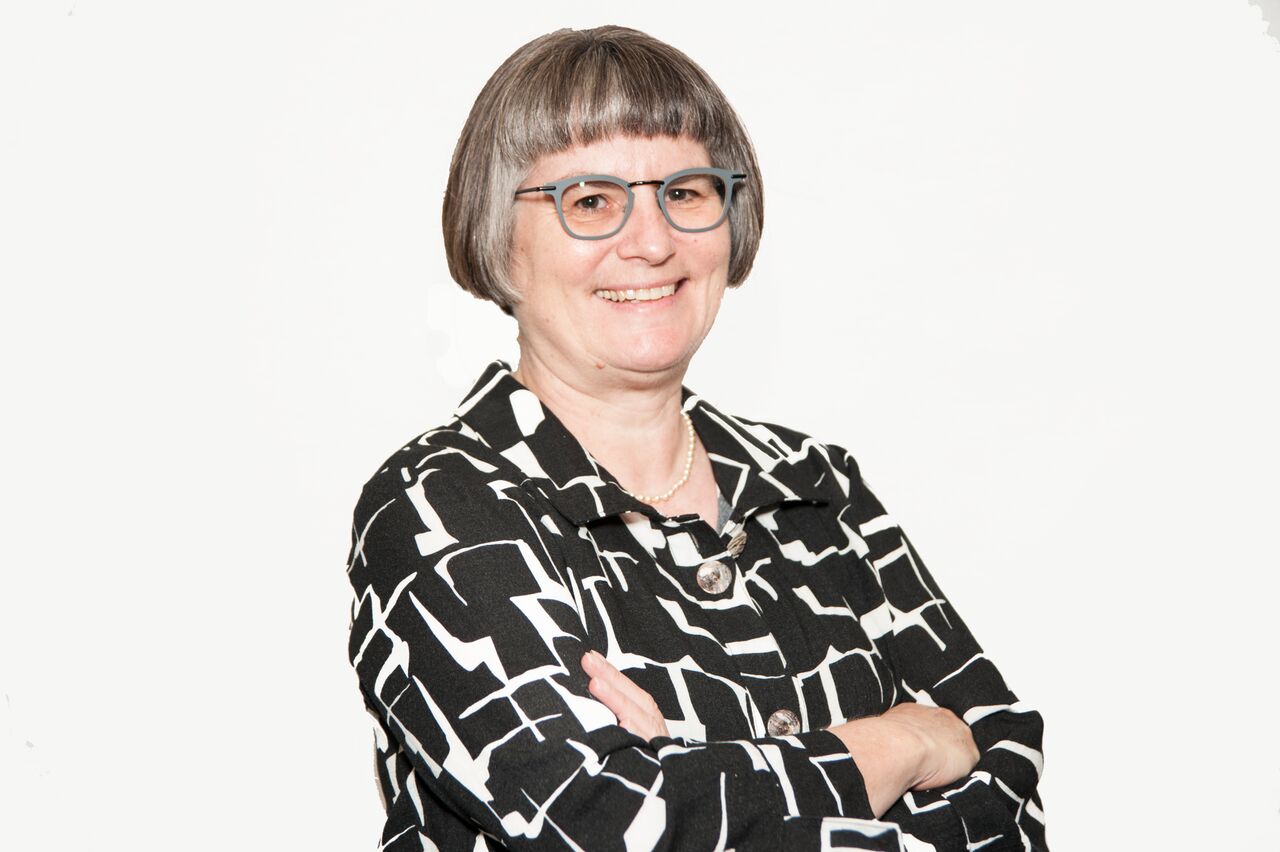 WELCOME!
WELCOME!
Welcome to the Center for the Humanities and the Public Sphere!
In this annual letter the Director of the Humanities Center traditionally reports on the events and programming of the past year and offers an outlook for the coming year. This year should be no different, even though the global pandemic has imposed its periodization of “before” and, so we hope, “after” and brought with it a warped sense of time, in which days become indistinguishable from each other and time seems to move faster and slower at the same time.
Faculty find themselves simultaneously over-engaged and isolated. Humanities faculty members should be familiar with the solitary writing, but we have experienced severe challenges to research, from shuttered archives and libraries to travel restrictions and canceled meetings. The shift to virtual spaces and communities for teaching, scholarship, and public engagement has been challenging. Yet, we also discovered unexpected benefits and opportunities, such as increased conversations on a national level about the humanities, webinars about graduate education, and virtual summer writing groups.
While I vividly remember the last live event already with fewer attendees who kept social distance from each other, virtual communities have emerged to support and collaborate with each other. In 2019-2020, the Humanities Center undertook or supported diverse programs that reached more than 6,000 audience members. CHPS cosponsored twenty-six events and projects by faculty members and student groups, including graduate student conferences, film screenings, symposia, and pedagogy workshops.
ENVISION HUMANITIES: A GRADUATE STUDENT TOOLKIT FOR THE 21ST CENTURY
Summer 2020: Virtual Public Humanities Graduate Internships and Workshops
In the summer of 2020, CHPS offered inaugural public humanities internships to four Ph.D. students from the humanities: Christopher Lomelin (Religion) interned at the Historic Thomas Center, Gainesville, FL, Lauren Cox (English) at the Hippodrome Theatre Lori Lye (Spanish and Portuguese) at Howard W. Bishop Middle School, and Danielle Jordan (English) at the Howard T. Odum Florida Springs Institute in High Springs. Danielle Jordan explored how in spring conservation scientists and activists often recognize that pressing matters of environmental protection are inseparable from human history, while Lori Lye created a system for Howard W. Bishop Middle School to organize its volunteers that, according to Director LaToya Jennings-Lopez, could serve as a model for other schools in the district.
CHPS also sponsored four PhD students in the humanities to participate in virtual workshops organized by the National Humanities Center. Samantha Baugus (English), Vickie Machado (Religion), and Kimberly Williams (English) attended Passionate Teaching in a Research Environment: How to Create Meaningful Online Learning Experiences and Lauren Cox (English) participated in Podcasting the Humanities: Creating Digital Stories for the Public. The week-long virtual workshop provided training for PhD students to translate research, commentary, and community-sourced narratives into podcast episodes. You can listen to the podcast that her group of doctoral students created about “Intimacy on Zoom” here.
All four PhD students will share what they learned at the opening event in the Center’s annual Synergies series in September.
CHPS will award five virtual residencies with the National Humanities Center on online teaching and podcasting in the humanities in December. The call for applications will be available shortly.
HUMANITIES ENGAGEMENT SCHOLARS: The Undergraduate Program in the Humanities Center
The Humanities Engagement Scholars, a program for undergraduates interested in the humanities, had an exciting and invigorating last year. Events in the Humanities Center included meetings on research opportunities and study abroad offerings. Humanities Engagement Scholars shared Coffee without Borders with students from around the world at the International Center. A new mentorship program paired graduate with undergraduate students in the humanities. If you are an undergraduate student who is interested in the program, you can apply to the program at this website https://humanities.ufl.edu/humanities-engagement-scholar/. If you are a graduate student who would like to participate in the mentorship program, email Alexandra Cenatus at acenatus@ufl.edu.
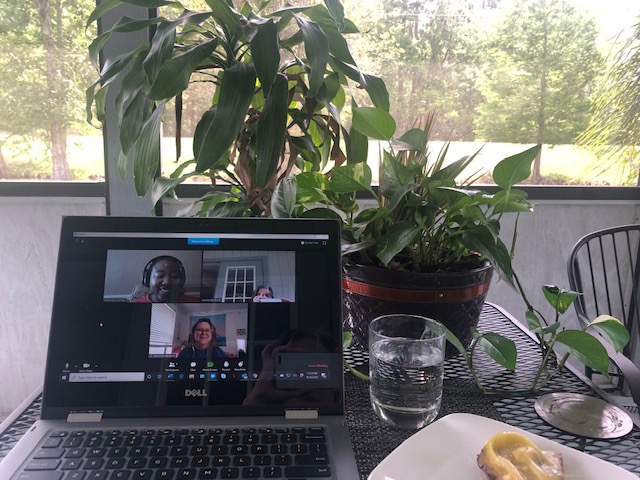
CONVERSATIONS IN THE NEIGHBORHOOD: Let’s Talk about Food!
2020-21 will initiate the public engagement series Conversations in the Neighborhood, which responds to current social issues and connects with audiences beyond academia. Highlighting the relevance of the public humanities, the first series in this coming year focuses on food. By gathering community members, local farmers, government officials, and humanities scholars, we ask: How do we tell our families’ stories about food? How does migration influence the ways we eat in Gainesville? How does climate change affect what we consume?
Events will be virtual, free, and open to the public. For questions, please contact Alexandra Cenatus as acenatus@ufl.edu
SPEAKER SERIES
Rethinking the Public Sphere Part I: Race and the Promise of Representation
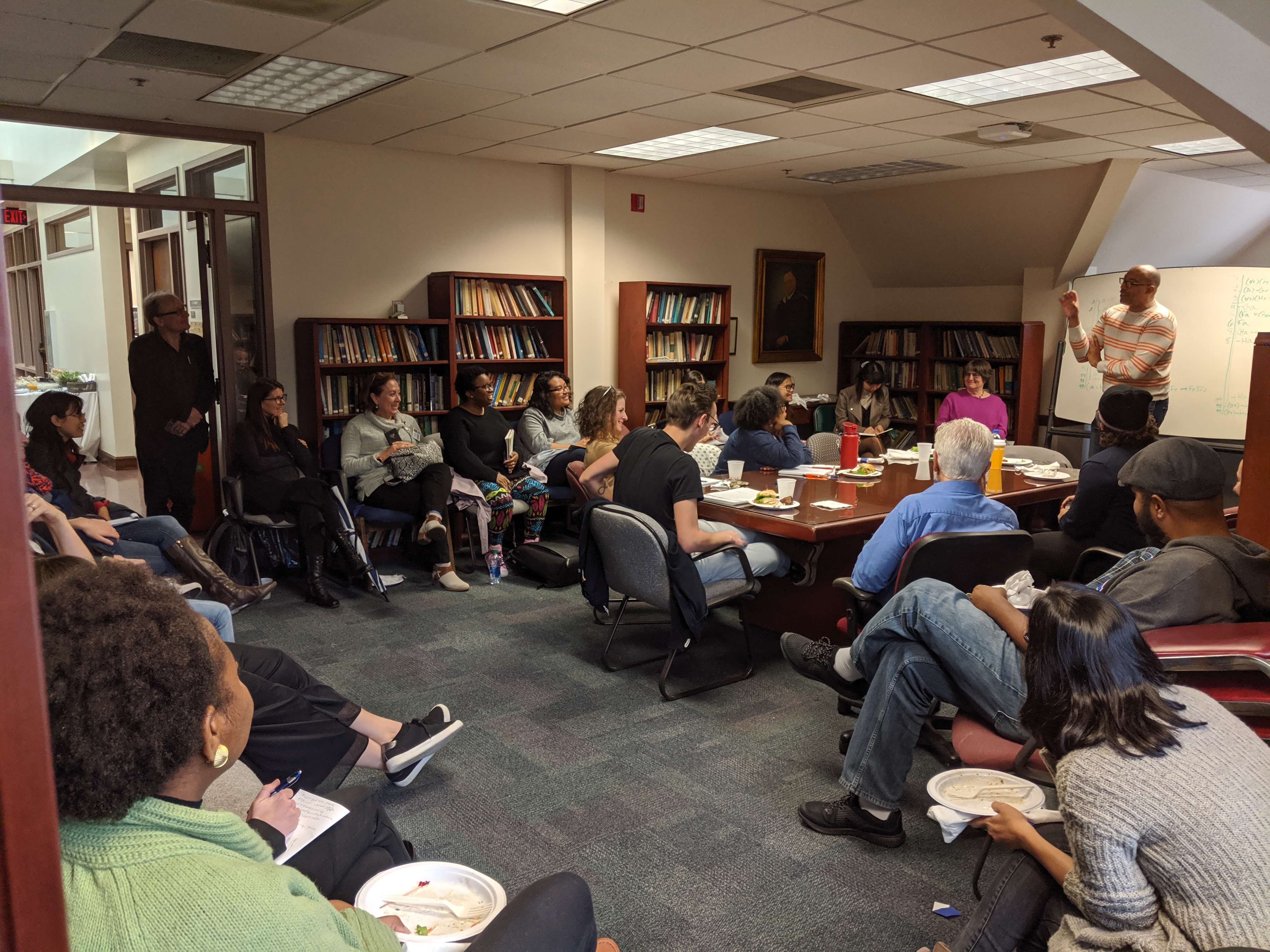
Last year, CHPS launched a multi-year lecture series that rethinks the public sphere and responds to current challenges to civil debate. Speakers from different humanities disciplines shed light on the core institutions that define public life. The 2019-20 speaker series highlighted the demand for racial equality in the international and historical contexts of the public sphere. Professors Ana-Lucia Araujo (Howard University), Chris Lebron (Johns Hopkins University), and Leigh Ann Wheeler (Binghamton University) addressed slavery in museums, a philosophical approach to the question of race, and voting rights in the era of Black Power, respectively.
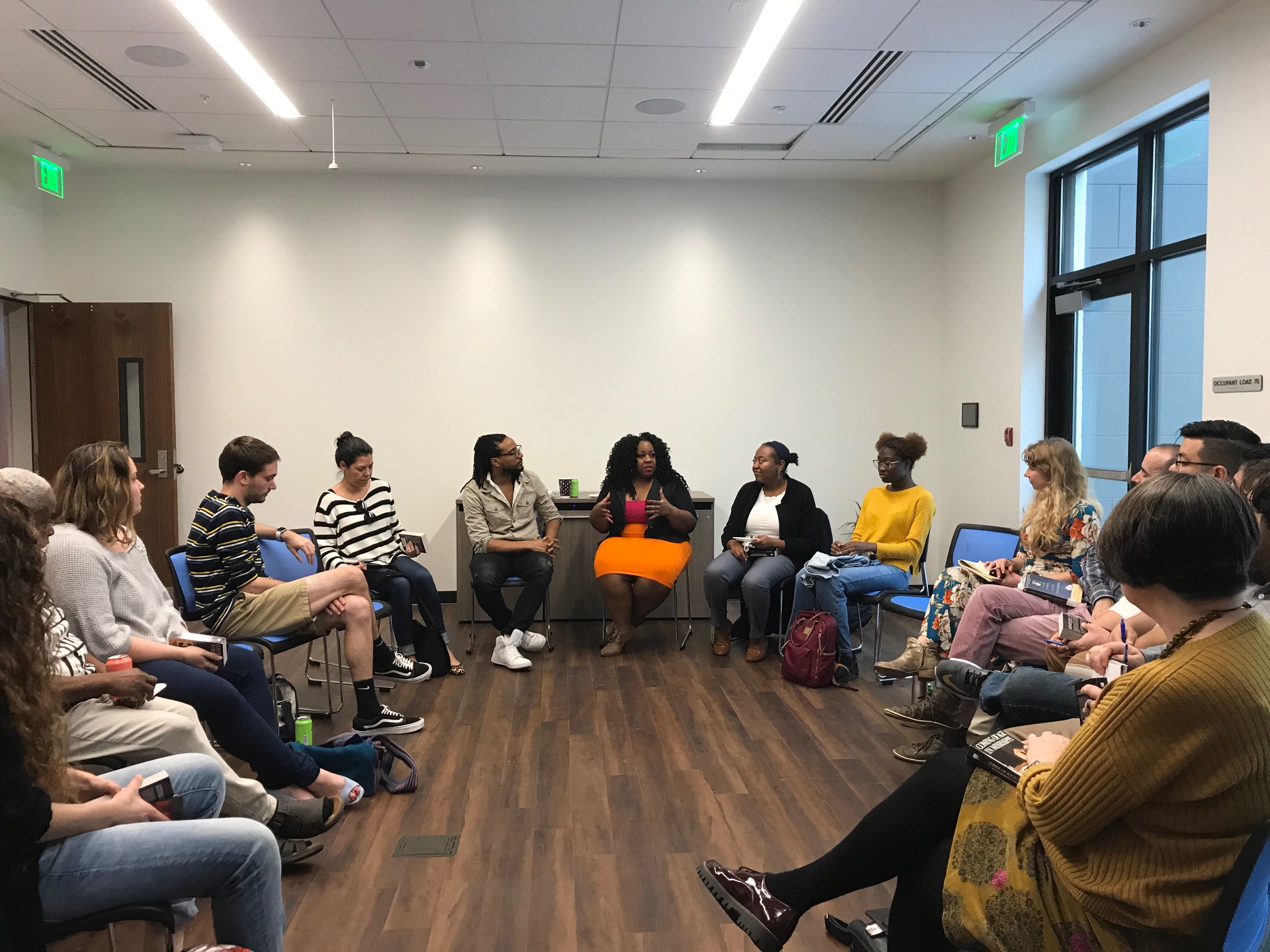
The Humanities Center accompanied the public talks with reading groups on Anne Moody’s memoir Coming of Age in Mississippi (1968) in the Institute for Black Culture and in the Downtown Library of the Alachua County Library District.
Rethinking the Public Sphere Part II: Data & Democracy
For 2020-21, CHPS will continue the conversation about the transformation of the public sphere by exploring the question of how technology, underlying algorithms, and artificial intelligence shape human experience, communication, and representation. The speaker series Data & Democracy focuses on questions of race, diversity, equity, and gender in data science. Do algorithms reproduce existing inequities of perception or can they move us beyond human error and preconceived notions? How do we deal ethically with data?
Four speakers will address topics on inequity and fairness in data science (Solon Barocas, Cornell University), feminist approaches to data science (Catherine D’Ignazio, MIT), technology and race (Ruha Benjamin, Princeton University), and artificial intelligence and humanity (Sylvester A. Johnson, Virginia Tech). In addition to Zoom talks, we will offer workshops on ethical consideration in the research with data, opportunities for doctoral students to receive feedback on their dissertation projects, and conversations among the sciences, humanities, and social sciences.
THE ANDREW W. MELLON FOUNDATION INTERSECTIONS AWARD
The Mellon Intersections Program advanced undergraduate education and public engagement with course development and public events. Four groups, Ethics in the Public Sphere, Global Blackness and Latinx Identity, Mass Incarceration, and Imagineering and the Technosphere, including eight doctoral students, organized forty-one public events in 2019-20, which attracted over 1200 participants. They included Ethics Cafes, which guided undergraduate students in broaching difficult topics, such as migration and climate change. One hundred and fifty undergraduate students enrolled in the program, and six Intersections Scholars graduated in spring semester 2020. We look forward to ongoing programming in 2020-21 and our concluding symposium on April 23, 2-4pm.
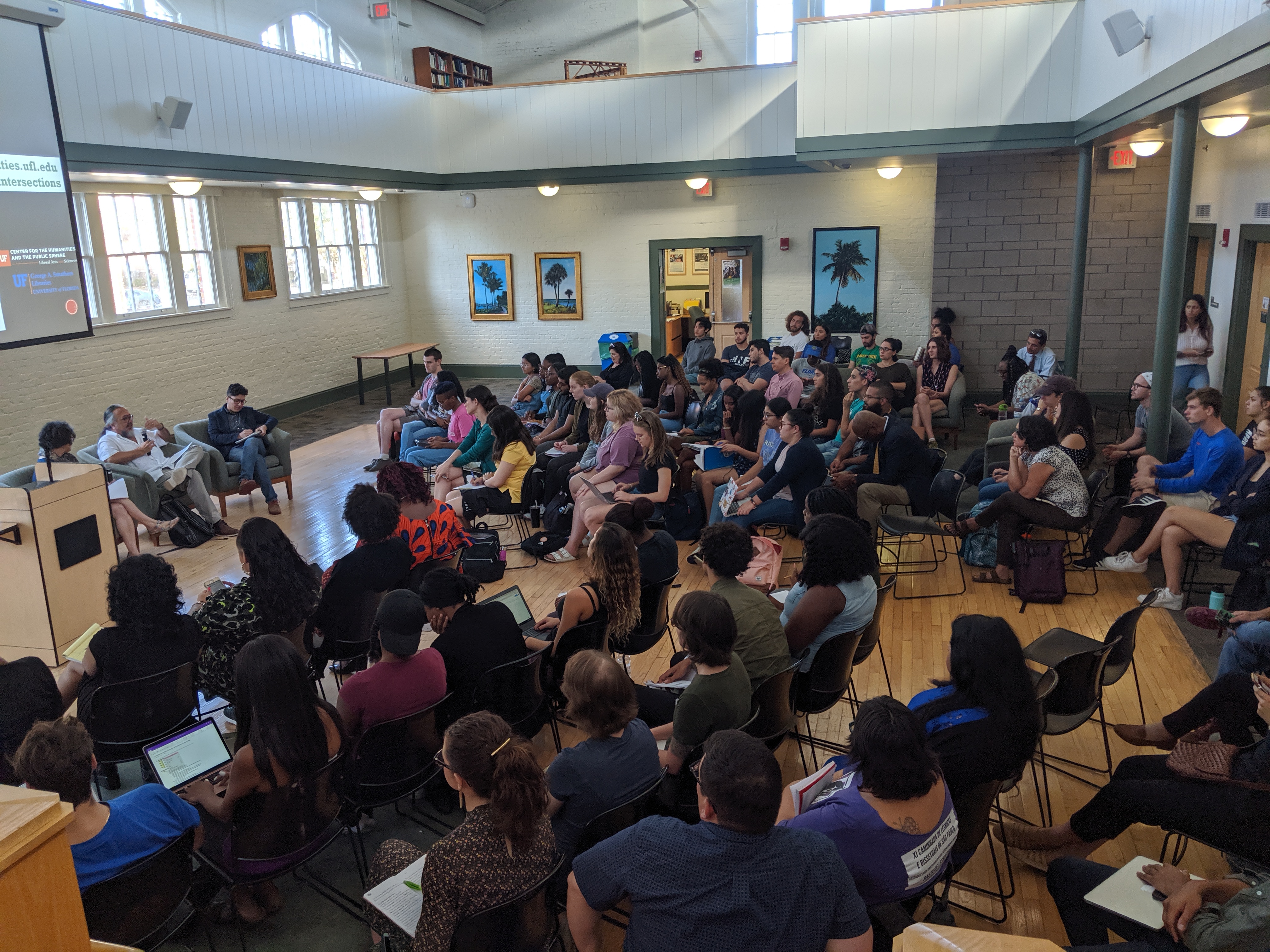
ADVOCATING FOR THE HUMANITIES ON THE HILL IN WASHINGTON, DC
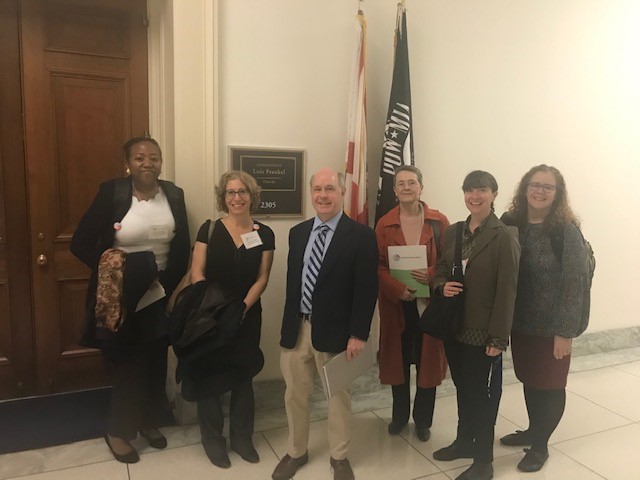
CHPS Assistant Directors Kristen Galvin and Alexandra Cenatus advocated for the humanities on Capitol Hill in March in an annual event organized by the National Humanities Alliance in Washington, DC.
MEET YOUR NEW COLLEAGUES IN THE HUMANITIES
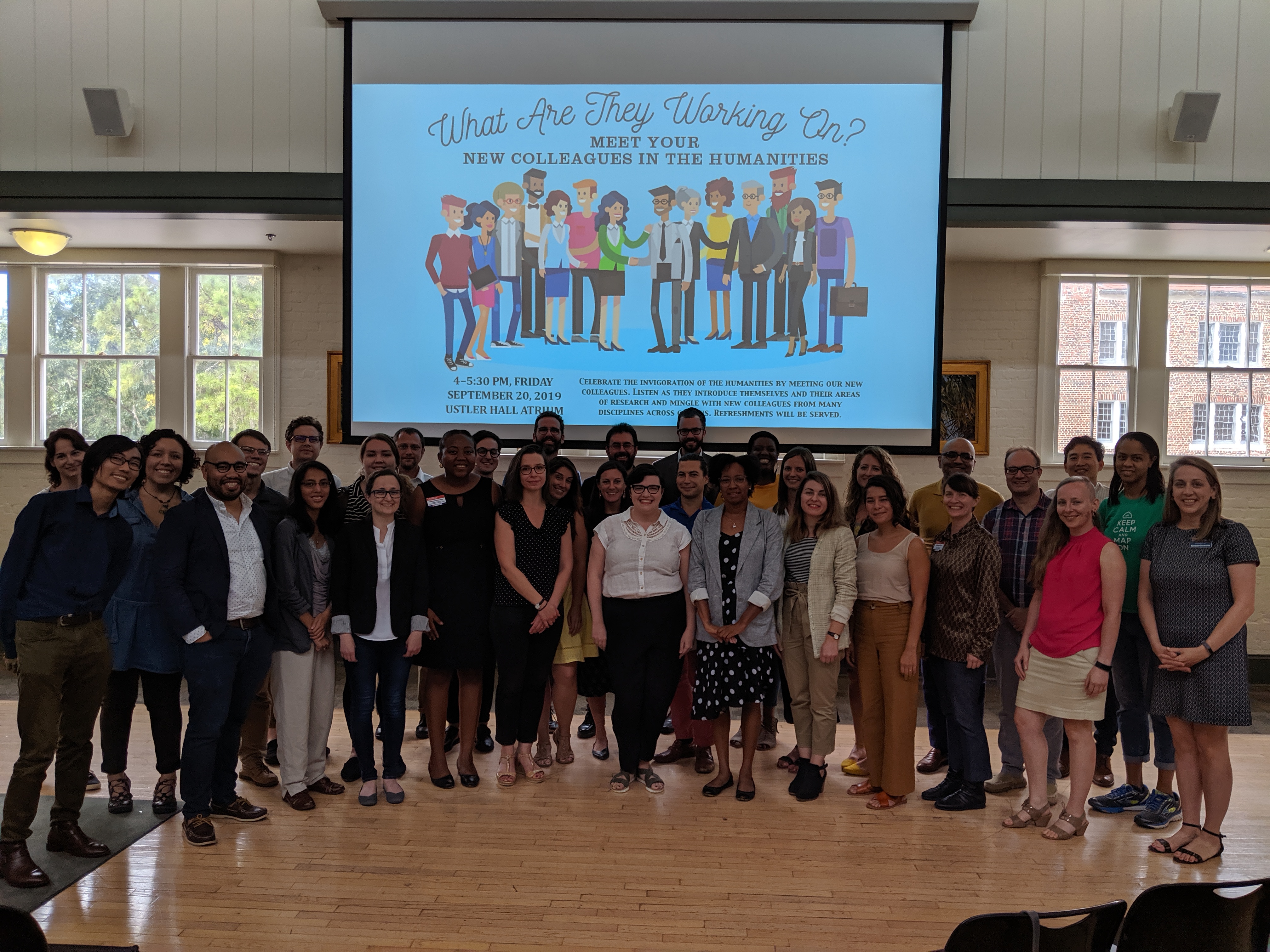
CHPS organized the third New Faculty Welcome event in fall 2019 with thirty-five faculty members and sixty attendees. We will continue to celebrate the invigoration of the humanities in CLAS and beyond with our welcome event for newly arrived faculty members with an upcoming virtual New Faculty Welcome in fall 2020.
COASTS, CLIMATES, THE HUMANITIES, AND THE ENVIRONMENT CONSORTIUM (CCHEC)
The efforts of the Andrew W. Mellon Foundation’s awarded consortium planning grant to the University of Georgia in collaboration with the University of Florida, University of North Carolina Chapel Hill, and Louisiana State University entitled “Coasts, Climates, the Humanities, and the Environment Consortium (CCHEC)” continue despite the setbacks brought on by the pandemic. In addition to Barbara Mennel, participating faculty at UF include Terry Harpold (English), Jack Davis (History), Ken Sassaman (Anthropology), and Cynthia Barnett (Journalism).
Watch Terry Harpold in virtual conversation with literary scholar Nicholas Allen (University of Georgia), historian Malinda Maynor Lowery (University of North Carolina-Chapel Hill), and geographer Craig Colten (Louisiana State University) about the project here.
WRITING RETREAT AND VIRTUAL WRITING GROUP
In May 2020, thirty faculty members gathered for an intensive week of writing in a virtual setting. Faculty members with writing and research projects in the humanities continued meeting regularly throughout the entire summer of 2020.
UF SYNERGIES: CURRENT SCHOLARSHIP IN THE HUMANITIES
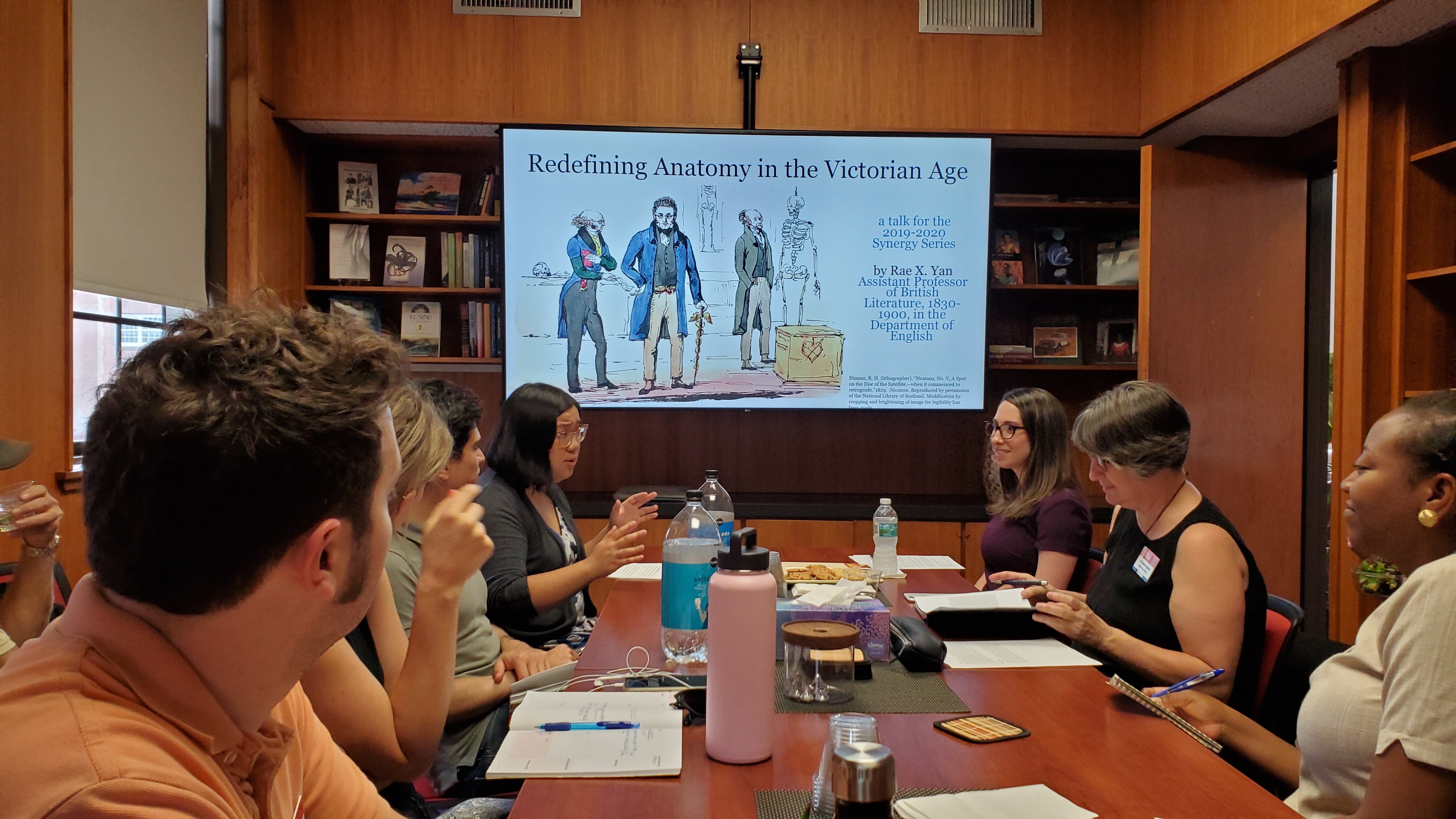
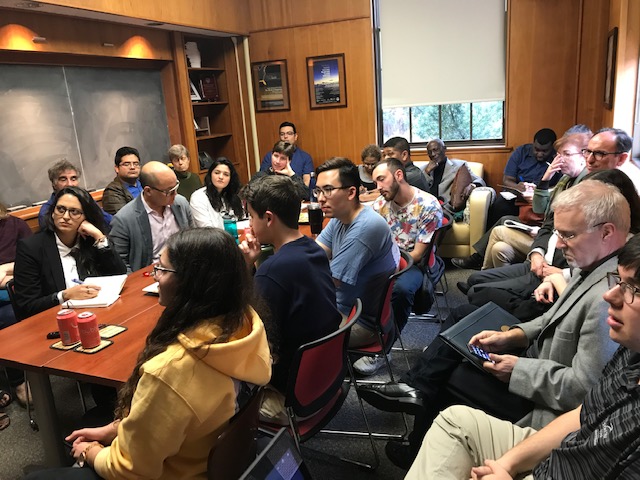
With the ongoing support from the Rothman Endowment, CHPS awarded four Rothman Faculty Fellowships for summer 2020 to Fiona McLaughlin (LLC and Linguistics), Victor Del Hierro (English), Bonnie Ernst (Sociology), and Lauren Pearlman (History). The Rothman Endowment also supported doctoral fellowships Emily Theobald (Music), Laura Colkitt (Art History), Lauren Walter (Art History), and Alison Raper (Art History) exploring topics ranging across regions and time periods. Finally, with the support of the Tedder Family Endowment, the Center awarded Tedder Family Doctoral Fellowships to David Meltsner (History) to conduct research on the school-to-prison-pipeline and Rachal Burton (English) to work on Toni Morrison’s literature. These awardees will present their research in our year-long series, “UF Synergies: Current Scholarship in the Humanities” over the next two years.
UPCOMING EVENTS SUPPORTED BY SPEAKER SERIES GRANTS
Funded by the Rothman Endowment, the Center is supporting a rich program of lectures, conferences, and workshops this upcoming academic year with Terry Harpold (English) and Libby Ginway (Portuguese) organizing a symposium entitled Latin America Writes Back 2.0: Climate Change and Science Fiction, Colleen Rua (Theatre) and Rachel Carrico (Dance) planning a workshop with artists on the topic of Disaster and the Body, and Fiona Stewart-Taylor (English) envisioning the 2021 Graduate Comics Organization Conference. Awards from the Rothman Endowment enable Jillian Hernandez (Center for Gender, Sexualities, and Women’s Studies Research) and Lisa Iglesias (Art History) to offer a forthcoming symposium entitled Radical Femininity: Woman of Color Imaginaries, New Political Iconographies, David Hackett (Religion) to design a speaker series on Religion and Public Life in Polarizing Times, and Nancy Hunt (History) to arrange events on Graphic Zine Interpretations: Listening to A Congolese Comic Artist & the African Digital Humanities.
PROGRAMS IN THE PUBLIC HUMANITIES GRANTS
CHPS supports three initiatives advancing the engagement with the public in 2020-21. Spanish graduate student Alejandro Acero Ayuda and immigrant family liaison specialist Kamil Leavitt are developing a program to connect local K-16 students with bilingual elderly storytellers who will provide them with personal and culturally authentic stories based on their own experiences.Classics graduate students Anastasia Pantazopoulou and Anthony Smith collaborate with Girls Place program directors Nevada Smith and Lynn Little to create an interactive space for girls to reflect on their identity as active community members and their multiple roles by discussing the stories of inspirational ancient Greco-Roman goddesses. John R. Nemmers (George A. Smathers Libraries) and Carmen Grimes-Eccles (Pan Caribbean Sankofa, Inc.) will jointly examine the history and lives of the Caribbean people who lived and worked in the former Panama Canal Zone and in Panama.
READING GROUPS IN THE HUMANITIES
This is the second year that the Center for the Humanities and the Public Sphere funded reading groups. The upcoming year’s interdisciplinary groups cross a range of colleges to address diverse topics in and with the humanities, such as “In Praise of Uselessness,” “Black Education Research Collective,” “Human – Animal Studies Group,” and the “Cultural Studies in the Arts Working Group.”
LIBRARY ENHANCEMENT
Two library enhancement grants this year are supporting the acquisitions of material on music, dance, and culture of the Africa and the Atlantic Diaspora, and are enhancing the collection in Islamic Studies.
PUBLICATION SUBVENTION
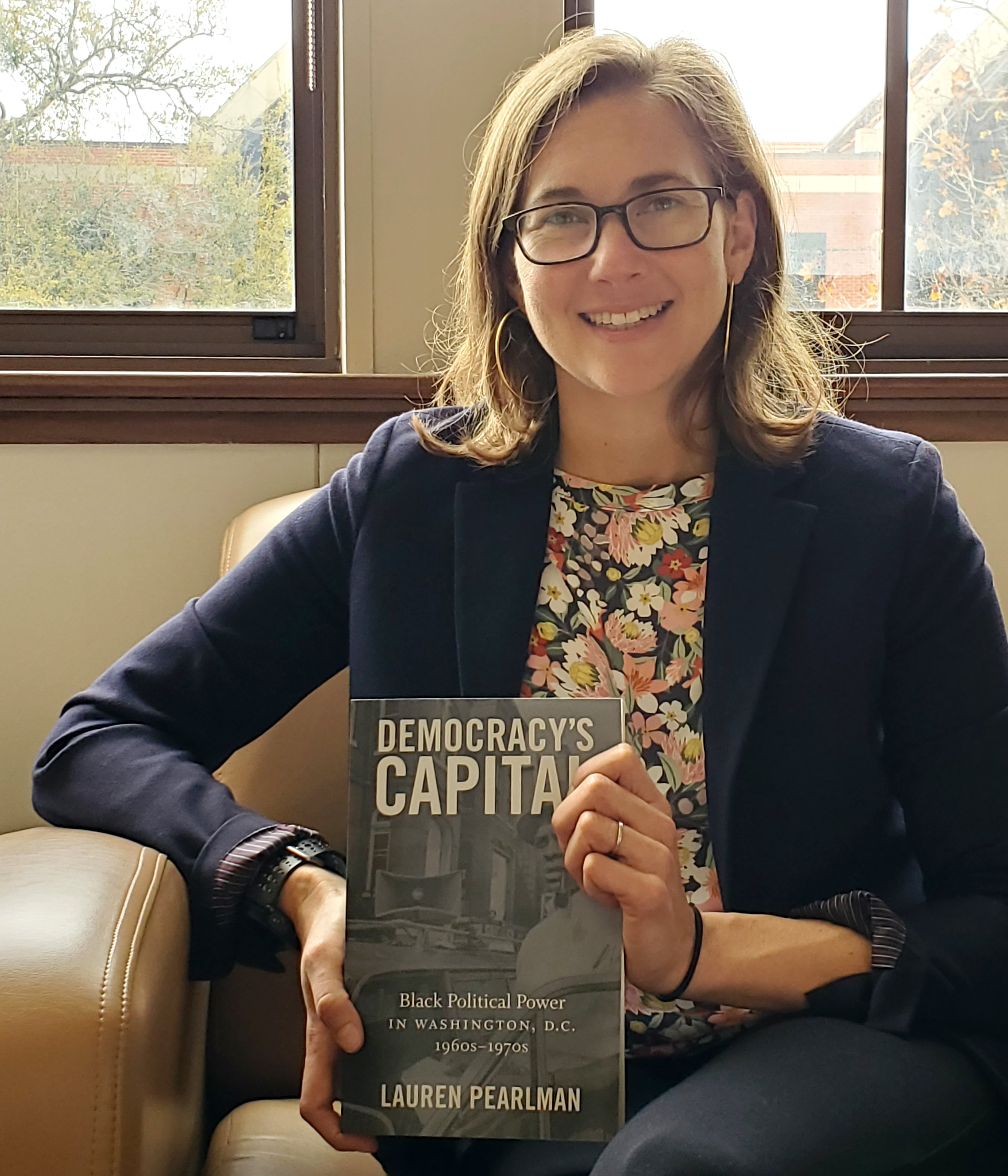
The Rothman Endowment and CLAS supported the publication of a significant number of scholarly books in the humanities: Peter Schmidt’s The History of Kiziba and its Kings (Mkuki na Nyota Press), Malini Schueller’s Campaigns of Knowledge: U.S. Pedagogies of Colonialism and Occupation in the Philippines and Japan (Temple University Press), Galina Rylkova’s Breaking Free from Death: The Art of Being a Successful Russian Writer (Academic Studies Press), Jeffrey Needell’s The Sacred Cause: The Abolitionist Movement, Afro-Brazilian Mobilization, and Imperial Politics in Rio de Janeiro (Stanford University Press), and Lauren Pearlman’s Democracy’s Capital: Black Political Power in Washington, D.C., 1960s–1970s (University of North Carolina Press).
Soon we will publish our call for proposals for fellowships, grants, and public programs!
Please visit our website or email any of us with questions or suggestions. You find a list of our staff here.
CHPS has counted itself fortunate to be supported by individuals, foundations, and units at and beyond UF. The generosity of those listed here bespeaks the commitment to the value of what we do. I conclude this letter by expressing my appreciation for the support for events and programs mentioned in this letter by the Margaret and Robert Rothman Endowment, the Tedder Family Endowment, the Humanities Fund, the Yulee Lectures Endowment, The Andrew W. Mellon Foundation, the College of Liberal Arts and Sciences, Barbara Mennel’s Waldo W. Neikirk Professorship, the Rothman Family Chair in the Humanities (Jack Davis), the Community School Grant Program, a Community Project Grant by the Florida Humanities Council, the Office of Equity and Inclusion of the City of Gainesville, the African American Studies Program, the Bob Graham Center for Public Service, the Center for African Studies, the Center for European Studies, the Center for Gender, Sexuality, and Women’s Studies Research, the Center for Latin American Studies, the Hyatt and Cici Brown Chair of Anthropology (Ken Sassaman), the Hyatt and Cici Brown Chair of History (Sean Adams), the Department of History, the Department of Languages, Literatures, and Cultures, the Department of Philosophy, the Department of Political Science, the Department of Spanish and Portuguese Studies, the George A. Smathers Libraries Fund, the Graduate School, the International Center, the Chief Diversity Officer, the Office of Research, the Samuel Proctor Oral History Program, and the School of Art and Art History.
I appreciate all of your support and look forward to meeting you virtually and in person over the coming academic year!
Warmly,
Barbara Mennel
Rothman Chair and Director
Center for the Humanities and the Public Sphere
University of Florida
August 16, 2020
Previous Letters from the Director: